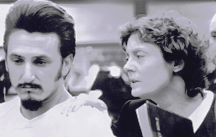'Dead Man Walking' argues against capital punishment
By Richard von Busack
SISTER HELEN PREJEAN (Susan Sarandon), a New Orleans nun who has been working among the poor since she took holy orders, decides to answer some letters requesting pen pals for prison inmates. She meets Matthew Poncelet (Sean Penn), a convicted killer at Angola State Prison in Louisiana, sentenced to die by lethal injection. Tim Robbins' new film, Dead Man Walking, based on Prejean's memoir, is the story of the friendship before the midnight execution, and if it sound like exactly the sort of film you'd like to avoid, it isn't.Robbins' movie is unsentimental, in many respects. The waxy-faced narcissist Poncelet, with his Aryan Brotherhood sympathies and one other matter unveiled during the film, is eminently killable. Yet Robbins makes you realize, with a minimum of manipulation, why Poncelet shouldn't be given the hot shot.
To underscore the dilemma, Robbins also acquaints us with the people whose lives were ruined by the crime Poncelet is accused of committing. R. Lee Ermey--typecast as a military type ever since he played a Marine drill instructor (which he was in real life) in Full Metal Jacket--is the father of a murdered girl, thirsting for Poncelet's blood. Raymond J. Barry, father of her murdered boyfriend, is more numb with grief, shunned and facing divorce. Both embody the emotional reasons why people want murderers dead; both subtly prove the good old liberal notion that justice is best left to neutral parties.
Sarandon's performance as Prejean is smooth and unflashy, without serious rage; it builds to an emotional climax at the execution that's an indescribably tricky bit of action--one glimpse of the actress underneath the nun's persona and the scene would be revoltingly sentimental. Sarandon's nun makes you marvel once again at the sort of people who can find the faith to expose themselves to trouble. (Prejean, in interviews, likes to disabuse us of this notion, as Sarandon's line has it here; it's not faith, she says, it's work.)
Sarandon's character balances Sean Penn's Poncelet, who doesn't deserve as dignified a term as evil. Can Penn constrict his pupils at will, like a parrot? Whatever Penn's qualities are off camera--repellent little grind that he is--there's no question that he subsumes himself into his role, evaporating his own personality into someone else's. His Poncelet is the least romantic transgressor you're apt to see in years, begging the question not just of why we sponsor killings, but also of what is to be done with such people as Poncelet represents?
Robbins focuses on the mundane, the smallness of a state prison, its lack of architectural drama, filming on location in Angola and at some of the poorest quarters of New Orleans (and the United States). As director, Tim Robbins made the choice to hire his brother, David Robbins, to write the music, and the other Robbins has put together an outstanding selection of Armenian and Indian compositions, a provocative soundtrack which unfortunately ends with a ballad by Bruce Springsteen at his most obvious. Still, the soundtrack succeeds in purging the film of Dixie cuteness and New Orleans quaintness (though the first time Sarandon uses the Southern accent, you cringe, thinking, here it comes).
Poncelet is a combination of two different inmates that Sister Prejean knew. Most films ostensibly based on true stories are a mixture of the true, the fictional, and the too good to be true, which is true nonetheless. Do the guards really bellow "dead man walking" as the prisoner makes his way to the killing room? Does a prisoner strapped in the bed for lethal injection really have both arms out, and is he truly wheeled to face the witnesses to be seen for a moment as if strapped to a cross? Is there much evidence, as Robbins has a lawyer character assert, that lethal injection is cruel and unusual punishment, in the sense that it is painful (as opposed to being arbitrary, expensive and useless as a deterrent)?
Even if Dead Man Walking wasn't in the kind of shape it's in, it would merit honor for its critique of capital punishment. The prison population just increased to more than 1 million, according to Reuters, and the total number of people held in prisons and jails has almost tripled since 1980. The popular demand for capital punishment is the crowning idiocy in a hill of comforting idiocies that constitute the criminal justice system. Capital punishment has been nothing but a spectator sport ever since it was first devised, and more damage never makes damage better: This is the lesson of Sister Prejean's memoir, and it has been faithfully transcribed into a deeply moving film.
[ Movies Index | Metro | Metroactive Central | Archives ]
From the January 18-24, 1996 issue of Metro.
© 1996 Metro Publishing Inc., San Jose, CA. All rights reserved. Reproduction
or retransmission in any form prohibited without publisher's written permission.

